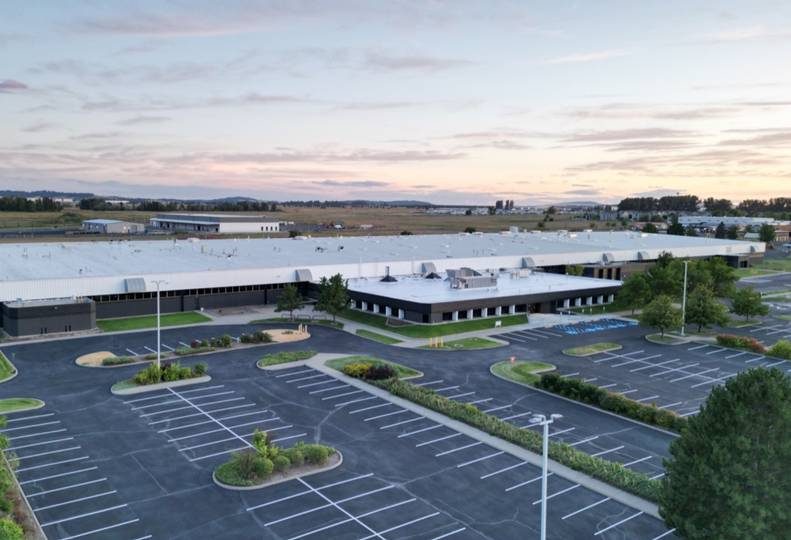
Home » Spokane's proposed aerospace center named 'tech hub'
Spokane's proposed aerospace center named 'tech hub'
Consortium led by Gonzaga, Lakeside Cos. to compete for up to $70M in federal funds

The former Triumph Composite Systems Inc. building, in West Spokane, will be the site of the American Aerospace Materials Manufacturing Center.
| Lakeside Cos.October 23, 2023
A proposed advanced aerospace manufacturing center in Spokane has received a federal designation as a “regional technology and innovation hub,” enabling advocates to pursue up to $70 million in federal funding for the project.
As the Journal reported in August, the Inland Northwest Consortium, led by Gonzaga University and Lakeside Cos., has pitched converting the 386,000-square-foot former Triumph Composite Systems Inc. plant at 1415 S. Flint, in west Spokane, into what would be called the American Aerospace Materials Manufacturing Center.
The proposal was one of 387 nationwide seeking the federal tech hub designation. Now, it’s one of 31 across the U.S. chosen to participate in the second round of evaluations. Ultimately, between five and 10 projects will be chosen to receive between $40 million and $70 million in federal funds.
According to the U.S. Economic Development Administration, the tech hub designation is “a strong endorsement of a region’s plan to supercharge a critical technology ecosystem” and become a global leader in that industry.
The deadline to submit second-phase proposals is Feb. 29, 2024.
The Inland Northwest Consortium involves about 50 public- and private-sector organizations.
About a dozen aerospace manufacturers and other large corporations have joined in, including Boeing Co., Lockheed Martin Corp., and Avista Corp. Five labor and workforce organizations and two venture development companies also are participating.
In addition to Gonzaga, 10 universities, community colleges, and school districts are involved, as are 16 local governments, tribes, and business organizations. NASA and Pacific Northwest National Laboratory are listed as working “in partnership” with the consortium.
In a press release, Gonzaga University President Thayne McCulloh said, “The organizational, educational, civic, business, and cultural resources of this area are unmatched.” He also said the group is “perfectly poised to create the future.”
Lakeside Cos. bought the Triumph plant and the 50 acres on which it’s situated in mid-2021, roughly six months after the Pennsylvania-based maker of interior aircraft components announced it would wind down operations there.
Boeing originally built the plant in 1990 to make air ducts, floor panels, and other components for passenger airlines. It sold the plant to Triumph in 2013.
Another Spokane group that proposed development of a tech hub here isn’t listed among those invited to compete for funding in the second phase of the tech hubs program. That group, led by Washington State University Health Sciences Spokane and involving the Evergreen Bioscience Innovation Cluster, has proposed developing a tech hub for sterile therapeutics and injectables, pointing out that the region already has a foothold in that industry with companies such as Jubilant HollisterStier LLC and Selkirk Pharma Inc. based here.
Evergreen Bioscience has proposed development of a four-story, 77,000-square-foot Evergreen Bioscience Innovation Building in Spokane’s University District as part of its plan to pursue the tech hub.
Andy Johnston, a board member with Evergreen Bioscience, told the Journal last month it would pursue development of the bioscience center regardless of whether it received the tech hub designation.
Latest News Education & Talent Manufacturing
Related Articles
Related Products
Related Events





